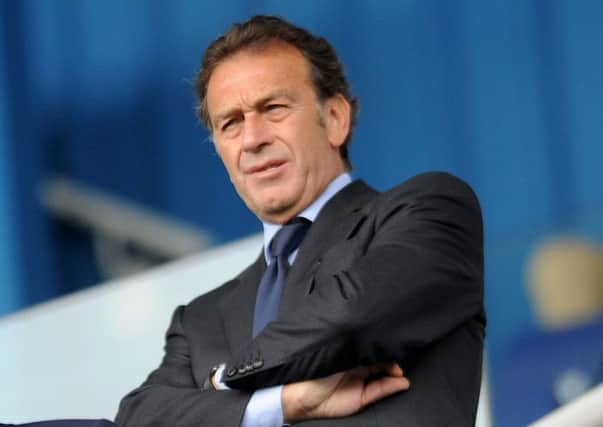Leeds United '“ Phil Hay: The wait goes on for FA '˜bung' verdict


In the meantime the striker has managed to go through 100 appearances and 42 goals for Fulham and a £12m transfer to Aston Villa, the commodity at the centre of a misconduct process which refuses to end. McCormack left Leeds for Fulham on July 8 in 2014. The Football Association was first notified of an illegal payment allegedly sanctioned by Leeds a few months later. It took until September of this year to bring the case before an independent regulatory commission and in the nine weeks since the evidence was heard, nothing.
The accusations have been documented to death: that Leeds and their owner, Massimo Cellino, agreed to pay a fee of £185,000 to McCormack’s licensed agent, Derek Day, in the knowledge that Day would pass the money to an unlicensed advisor working on McCormack’s behalf, thus breaking FA rules. Leeds and Day are understood to have pleaded guilty to contravening agent regulations soon after they and Cellino were charged in May of this year.
Advertisement
Hide AdAdvertisement
Hide AdWhile United admitted culpability, Cellino chose to deny and fight a separate charge against him; an undefined breach of FA rules which the governing body declined to outline in any detail. His hearing took place at Wembley over two days in mid-September, before Leeds’ 2-0 win at Cardiff City and in front of a disciplinary panel headed by chairman Nicholas Stewart QC.


Stewart is no stranger to FA disciplinary matters having previously handled the inquiry into the infamous brawl between Manchester United players and Chelsea staff in 2008, resulting in a four-game ban for Patrice Evra. Last year he chaired the panel which fined Jose Mourinho £50,000 after Mourinho, then manager of Chelsea, was found guilty of questioning the integrity of referee Robert Madley.
Much of the evidence against Cellino was provided by Graham Bean, a former employee at Elland Road who held a senior management role during the transfer of McCormack to Fulham but was sacked by Cellino after a row over a rearranged game in September 2014, a few months after that transfer went through.
Cellino’s legal representative cross-examined Bean at length and the hearing finished on the afternoon of September 16. Almost 10 weeks later, the matter remains in the hands of Stewart’s commission.
Advertisement
Hide AdAdvertisement
Hide AdThe case was complicated somewhat by an unexpected disagreement between Bean and the FA after his evidence was heard. Bean, the FA’s key witness, said the governing body was refusing to pay expenses of around £2,000 owed to him and threatened to withdraw his statement against Cellino in protest. The FA is understood to have taken issue with parts of Bean’s financial claim, insisting it would only refund documented losses.


Despite that argument, which is still to be resolved, Bean’s evidence is still expected to stand as and when the commission publishes a verdict. Two separate sources have told the YEP that a decision by Stewart’s panel was in fact reached some time ago and the commission is sitting on its decision without offering an explanation for the delay. Cellino could face a ban from football if the panel finds him guilty and deems his offence serious enough. Leeds are more likely to receive a financial penalty but the club’s sanction and any punishment imposed on Day are also undisclosed at this stage.
The FA has made no comment publicly but sources at the Association privately suggest that the commission wants to release all decisions, penalties and written reasons in one haul. The case is described as complex and delicate but the time taken to resolve it is markedly different to recent disciplinary matters involving Leeds. The claims of racism made against defender Giuseppe Bellusci by Norwich’s Cameron Jerome in 2014 – a case which required interpretation of foreign language – were heard in February 2015 and outlined by a full written verdict 13 days later. Bellusci was duly cleared. The biting charge brought against Souleymane Doukara last season was ruled upon on March 31. The panel responsible released its written reasons within a fortnight. Tim Kerr, the QC who handled Cellino’s successful appeal against the Football League’s attempt to block his takeover of Leeds, produced a decision and a 35-page document supporting it within two weeks.
Stewart was asked by the YEP to explain the delay and indicate a date for an announcement on Cellino’s charge. He declined to comment. Neither Leeds nor their owner have been made aware of the outcome or given sight of a written verdict. The FA, which effectively acted as prosecutor against the Italian during September’s hearing, insists it is also awaiting updates from the commission.
Advertisement
Hide AdAdvertisement
Hide AdIn the background are questions about whether negotiations between Cellino and Andrea Radrizzani over investment in Leeds have influenced the timeframe, or whether those negotiations themselves are dependent on the outcome of the McCormack case.
In all it is a curious dragging of heels, the result of which is still to come.